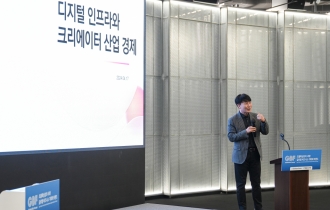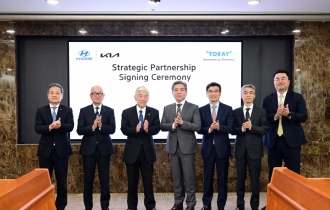[500 STARTUPS] A multibillion-dollar mission for 500 Startups Japan
[THE INVESTOR] SAN FRANCISCO -- The Japanese startup scene is definitely moving forward. In 2016, funds raised by venture companies in Japan grew 20 percent on-year to 210 billion yen (US$1.85 billion).
James Riney, CEO of 500 Startups Japan, is hoping to push that figure up to US$10 billion over the next five years.
“We want to grow the local startup ecosystem, but to do that we need to bring Silicon Valley best practices to Japan. Startups (in Japan) aspire to get to the multibillion dollar scale, but don’t have the same knowhow available in Silicon Valley,” Riney said in a recent interview with The Investor on the sidelines of the 500 Startups Premoney conference.

James Riney
The head of 500 Startups Japan was previously the co-founder of online publishing platform Medium.com of Japan, and set up a number of other startups. He was also a principal at DeNA Venture Capital Group where he invested in Southeast Asia.
In 2016, Riney was included in the Forbes 30 Under 30 Asia list, the same year when 500 Startups announced the close of its fund in Japan, about 1 1/2 years after it was first unveiled. The Japanese government played a big role in its closing, as it was a limited partner via its Cool Japan Fund.
The close of the US$35 million fund was higher than the original US$30 million target. Since then, 500 Startups Japan has bloomed into the largest fund for the global startup accelerator outside the US.
In Riney’s view, the success shows just how powerful the Japanese market can be. But the size still trails the country’s actual economic status, due to the disinclination of Japanese enterprises to go abroad, coupled with traditionally risk-averse attitudes. “Japan seems to be missing out,” Riney observed.
However, as the numbers show, change is happening. “It’s not just the numbers, but more talented entrepreneurs (from top universities like Tokyo and Kyoto) are coming (into the scene),” he said.
Joining a startup could be a trendy global trend, but it’s also a generational issue, according to Riney.
“If you look at the people born in the late 80s and early 90s, they grew up in the lost two decades. And they never saw the world the way their parents saw it -- where innovation came from Sony and traditional Japanese companies. That was the bubble era. But those times are gone, and these people grew up in a world where massive wealth creation came from firms like Facebook, Uber and Airbnb, the small startups. So when they get into the workforce, they don’t have a deep respect for traditional companies.”
Eventually, unsure about their choice, they become much more prone to go out on their own.
There are also more examples, as the younger Japanese generation has witnessed founders who have exited companies and became angel investors.
As to how Riney came to head 500 Startups Japan, rewind to a few years ago when he was approached by the accelerator and saw an opportunity to “make an impact” in the Japanese startup ecosystem. “It felt like it had to be me,” he says, citing his background that includes nearly two decades of living in Japan, his fluency in the language and experience in the business landscape as an entrepreneur and an employee.
But growing up, Riney had never been an entrepreneurial role model. “I was never exposed to Silicon Valley growing up. I didn’t even know this world existed. When I started at J.P. Morgan, I knew right away it wasn’t for me. Then, I somehow stumbled upon a startup event in Japan. I was immediately hooked on the energy, the creation process from zero to one. It was a calling. I like being in the creation process, so I don’t think I can ever work for a big company again.”
As for future investment strategies, the CEO knows it won’t be something that’s already all the rage.
“We invest at the seed stage, where there are only two or three people. We are trying to find companies that aren’t trendy, but are creating trends. So I think the moment something becomes a buzzword, you are arguably too late for seed stage investment.”
AI and blockchain technology seem a bit overrated, according to the Riney. “AI and blockchain are simply features. They are technologies that are designed to cater to some particular needs. So maybe there’s an advantage in AI, but we are not specifically investing in the technology,” he said.
He added that Japan doesn’t actually seem ready for AI. “In Japan there are a lot of industries which rely very much on paper. At the same time our legacy enterprise systems are not very integrated. In order to develop useful AI, you need the data sets. And because a lot of stuff has not gone through software, you don’t have the data yet. But in some cases, we are getting a bit too ahead of ourselves,” he said.
Riney’s parting words were that while he’s ecstatic to be working in this environment, “entrepreneurship is not for everyone.” For people who are undecided about their career, he recommends going to work for businesses with smart people.
By Kim Ji-hyun (jemmie@heraldcorp.com)
EDITOR'S PICKS
- Trilateral talks acknowledge ‘serious’ slumps of won, yen
- Samsung C&T president makes her first business trip to Milan
- Seoul Business Agency CEO says SNS marketing essential for SME
- CJ Olive Young offers real-time translators for foreign visitors
- Hyundai Motor, Toray join hands for material innovation in mobility
- Paris Baguette debuts in the Philippines
- Samsung develops fastest DRAM chip optimzied for ondevice AI
- Amazon fuels e-commerce rivalry with free shipping campaign















